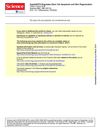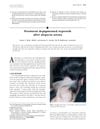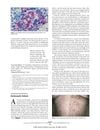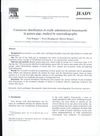 14 citations,
August 2018 in “Frontiers in Cellular and Infection Microbiology”
14 citations,
August 2018 in “Frontiers in Cellular and Infection Microbiology” Dengue virus can infect human hair follicle cells and may cause hair loss.
 7 citations,
March 2019 in “Frontiers in Cellular and Infection Microbiology”
7 citations,
March 2019 in “Frontiers in Cellular and Infection Microbiology” Understanding how our bodies interact with mosquito-borne viruses is crucial because there are few treatments and vaccines.
 4 citations,
September 2020 in “Frontiers in Microbiology”
4 citations,
September 2020 in “Frontiers in Microbiology” Algal oligosaccharides help prevent hair loss and promote hair growth.
 March 2024 in “Journal of Microbiology and Biotechnology”
March 2024 in “Journal of Microbiology and Biotechnology” Phloroglucinol may help improve hair loss by promoting hair growth and reducing oxidative stress.
 September 2023 in “Journal of microbiology and biotechnology”
September 2023 in “Journal of microbiology and biotechnology” A type of collagen helps hair grow by boosting cell growth and activating a specific hair growth pathway.
 210 citations,
July 1993 in “The journal of investigative dermatology/Journal of investigative dermatology”
210 citations,
July 1993 in “The journal of investigative dermatology/Journal of investigative dermatology” Hair color production in mice is closely linked to the hair growth phase and may also influence hair growth itself.
 109 citations,
July 1993 in “The journal of investigative dermatology/Journal of investigative dermatology”
109 citations,
July 1993 in “The journal of investigative dermatology/Journal of investigative dermatology” Hair color production is closely linked to the active growth phase of hair in mice and may also influence hair growth itself.
 78 citations,
June 2013 in “Science”
78 citations,
June 2013 in “Science” Mice without the Sept4/ARTS gene heal wounds better due to more stem cells that don't die easily.
 37 citations,
March 1990 in “The Journal of Pediatrics”
37 citations,
March 1990 in “The Journal of Pediatrics” Toxic shock syndrome is caused by a complex interaction of bacterial toxins and the immune system, and understanding this can help improve diagnosis and treatment.
 30 citations,
July 2017 in “BioEssays”
30 citations,
July 2017 in “BioEssays” Activating NRF2 might help treat hair disorders by improving antioxidant defenses.
 23 citations,
April 2002 in “Journal of the American Academy of Dermatology”
23 citations,
April 2002 in “Journal of the American Academy of Dermatology” Depigmented hair regrowth after alopecia areata can be permanent.
 20 citations,
April 2011 in “British Journal of Dermatology”
20 citations,
April 2011 in “British Journal of Dermatology” Reflectance confocal microscopy can tell apart white dots on the scalp as either sweat gland ducts or hair follicle openings.
 19 citations,
January 2010 in “Bioorganic & Medicinal Chemistry Letters”
19 citations,
January 2010 in “Bioorganic & Medicinal Chemistry Letters” Thyroid receptor agonists may treat male pattern baldness without harmful side effects.
 14 citations,
May 2013 in “Emerging infectious diseases”
14 citations,
May 2013 in “Emerging infectious diseases” Cryptococcus gattii can remain dormant in animals for over 8 years.
 11 citations,
December 2018 in “Assay and Drug Development Technologies”
11 citations,
December 2018 in “Assay and Drug Development Technologies” Natural herbal compounds might treat certain medical conditions by reducing DHT levels, but more research is needed to confirm their effectiveness and safety.
 10 citations,
February 2006 in “Archives of dermatology”
10 citations,
February 2006 in “Archives of dermatology” A man's chest hair turned white after a shingles infection, possibly due to virus-damaged pigment cells.
 9 citations,
November 2012 in “Hepatology Research”
9 citations,
November 2012 in “Hepatology Research” A man lost all his hair permanently after hepatitis C treatment, a side effect not seen before.
 6 citations,
February 2015 in “Journal of parasitic diseases”
6 citations,
February 2015 in “Journal of parasitic diseases” Ivermectin injections and spray, along with hygiene measures, successfully treated sarcoptic mange in guinea pigs.
 6 citations,
July 1990 in “The Journal of Pediatrics”
6 citations,
July 1990 in “The Journal of Pediatrics” A boy with toxic shock syndrome had severe heart rhythm problems but recovered with treatment.
 3 citations,
November 2015 in “Journal of Investigative Dermatology”
3 citations,
November 2015 in “Journal of Investigative Dermatology” Testosterone can both promote hair growth and cause baldness by affecting hair growth signals.
 3 citations,
December 1994 in “JEADV. Journal of the European Academy of Dermatology and Venereology/Journal of the European Academy of Dermatology and Venereology”
3 citations,
December 1994 in “JEADV. Journal of the European Academy of Dermatology and Venereology/Journal of the European Academy of Dermatology and Venereology” Oral itraconazole effectively reaches and treats deep skin layers in guinea pigs.
 2 citations,
July 2014 in “Our Dermatology Online”
2 citations,
July 2014 in “Our Dermatology Online” Contact immunotherapy can cause vitiligo in patients with autoimmune conditions.
 1 citations,
April 2019 in “Journal of Investigative Dermatology”
1 citations,
April 2019 in “Journal of Investigative Dermatology” Dupilumab is effective and safe for treating moderate-to-severe atopic dermatitis in adolescents.
 1 citations,
April 2019 in “Journal of Investigative Dermatology”
1 citations,
April 2019 in “Journal of Investigative Dermatology” VB1953 gel significantly reduced acne and resistant bacteria in patients who didn't respond to clindamycin.

COVID-19 may lead to severe skin necrosis without clear underlying causes, as seen in a diabetic patient who required leg amputation.
 April 2019 in “Journal of Investigative Dermatology”
April 2019 in “Journal of Investigative Dermatology” Many patients with autoimmune blistering skin disorders change their diets, avoiding foods like alcohol, citrus, and spices, and some find vegetables and dairy helpful.
 April 2019 in “Journal of Investigative Dermatology”
April 2019 in “Journal of Investigative Dermatology” Sandalore®, a synthetic scent, improved hair loss and satisfaction in women with telogen effluvium.
 March 1988 in “Journal of The American Academy of Dermatology”
March 1988 in “Journal of The American Academy of Dermatology” The document concludes that misdiagnosis in skin conditions is common, certain treatments can cause allergic reactions, and some skin symptoms are linked to leukemia, especially in certain Japanese regions.
 521 citations,
January 1954 in “Physiological Reviews”
521 citations,
January 1954 in “Physiological Reviews” Hair growth is cyclic and influenced mainly by local factors.
 451 citations,
March 2005 in “Endocrine Reviews”
451 citations,
March 2005 in “Endocrine Reviews” The enzyme steroid sulfatase is linked to breast cancer and other conditions, and inhibitors are being developed for treatment.






























